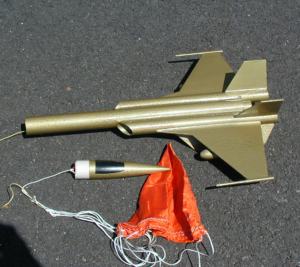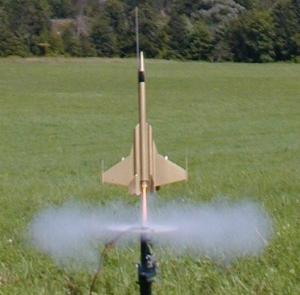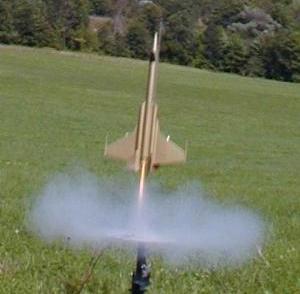| Construction Rating: | starstarstarstarstar_border |
| Flight Rating: | starstarstarstarstar_border |
| Overall Rating: | starstarstarstarstar_border |
| Manufacturer: | Rogue Aerospace |
The Rogue Interdictor was the second of three kits that I built as part of a rocket "ship" series. Rogue demonstrated some imagination regarding the description of their Interdictor: "The Interdictor is our concept model of a planetary fighter of the future. It's capable of flying within an atmosphere using its twin turbojet engines, or of conducting sub-orbital or orbital maneuvers through the use of its single plasma engine. Lightly armed with only two wingtip laser cannon, Interdictors are intended to attack enemy ships or stations en masse. The under-wing auxiliary fuel tanks are typically used to fly to a battle site, then jettisoned to improve maneuverability. Our model includes a sturdy plastic nose, numerous balsa parts for detail, and a large, colorful decal sheet to keep your Interdictor the center of attention!".
See my 18mm Futuristic Rocket Comparison Page
 The Interdictor comes with an 12" T-25 (25mm diameter) body tube, two (2) 8.9" T-19 tubes pre-cut with slanted ends for the Jet Intakes, and two (2) 1.75" T-14 tubes along with four (4) corresponding balsa nose cones that are used for the fuel tanks. There is an 18mm motor mount with motor retention, two (2) 3/32" balsa sheets for all the mounts and wings, and four (4) launch lugs for the Laser Canons (along with two hardwood dowels) and the actual launch lugs. The recovery system includes a 12" nylon parachute, 8" of elastic shock cord, 39" of Kevlar shock tether, and a piece of Perma-Wadding. There is also a 29" piece of Kevlar that is optionally used to have a horizontal parachute descent. The nose cone is in two pieces and is plastic. There is also a decal sheet for finish work.
The Interdictor comes with an 12" T-25 (25mm diameter) body tube, two (2) 8.9" T-19 tubes pre-cut with slanted ends for the Jet Intakes, and two (2) 1.75" T-14 tubes along with four (4) corresponding balsa nose cones that are used for the fuel tanks. There is an 18mm motor mount with motor retention, two (2) 3/32" balsa sheets for all the mounts and wings, and four (4) launch lugs for the Laser Canons (along with two hardwood dowels) and the actual launch lugs. The recovery system includes a 12" nylon parachute, 8" of elastic shock cord, 39" of Kevlar shock tether, and a piece of Perma-Wadding. There is also a 29" piece of Kevlar that is optionally used to have a horizontal parachute descent. The nose cone is in two pieces and is plastic. There is also a decal sheet for finish work.
CONSTRUCTION:
The instructions include 8 pages with mostly photos and some diagrams. They are well written and thorough. It is rated as a Skill Level 3 kit, but nothing was terribly challenging if one has some experience under his/er belt. The Skill Level 3 is no doubt derived from having to cut your own balsa pieces and the various angles needed on the fins. It is definitely more difficult than your typical 3-fin-nose-cone rocket.
I was pleased to see the instructions identify the parts for what they are verses generic. For example, attaching the "Jet Intakes" to the "Fuselage" or attaching the "Dorsal" and "Ventral" fins or attaching the "Fuel Tanks". This in comparison to the Estes' Night Wing instructions was nice because it gives the builder a sense of what they are putting together instead of "assemble balsa bottom cover pieces". Did it make it easier to build? Probably not, but more enjoyable.
The following areas of the build are interesting and may differentiate the Rogue kit from Estes, Quest or other kits of the like.
There are two (2) tube marking guides to mark the fuselage and the jet intake tubes. The instructions are very clear, and that is a good thing because the two jet intake tubes need to be marked opposite of each other since they are pre-cut (slant) and go on opposite sides of the fuselage.
Rogue instructions utilize a "double-glue" technique which is said to be a stronger joint. This is done by applying glue, aligning the parts, pressing and then separating them. Then the first glue is allowed to dry. After it is dry, a second glue application is made and the pieces are then held together until the glue sets. This technique is used to attach the jet intake tubes to the fuselage, and where the various fins attach.
Fin cut-out templates are provided and an illustration is provided to show how to place them on the balsa sheets. This is not too difficult at all. Once the fins are cut out, you are instructed to stack the like fins and sand their edges smooth. The main wing is in two pieces and needs to be assembled to create the full length wing. I would suggest using a straight-edge and weight on top to ensure a straight and flat joint. (Rogue doesn't mention the use of a straight-edge nor the weight on top). This technique works well.
The fuel tanks and the laser cannons are assembled in their own steps and then attached. Rogue took the extra step of providing a "Cannon Filler Sheet" to fill the space due to the diameter difference from the hardwood dowel and the launch lug tube. This helps keep it glued where it needs to be and makes it so it doesn't look sloppy. Rogue also recognized that the fins should be smoothed before attaching the fuel tanks and laser cannons since they would be in the way and make the smoothing job a lot more difficult if in place.
I scratched my head for a moment when I saw I had two launch lugs left. These were mounted on underside between the jet intake and fuselage tubes. Why two? Is there special launch equipment needed? No, aesthetics! Purely aesthetics. Good job, Rogue.
 The nose cone is assembled with CA or plastic cement, the Perma-Wadding™ is attached to the shock tether, the tether to the elastic, the elastic to the nose cone and the 12" nylon parachute at the Kevlar®/elastic connection. And that finishes the rocket assembly.
The nose cone is assembled with CA or plastic cement, the Perma-Wadding™ is attached to the shock tether, the tether to the elastic, the elastic to the nose cone and the 12" nylon parachute at the Kevlar®/elastic connection. And that finishes the rocket assembly.
There is an optional step of attaching the second piece of Kevlar so that once ejection occurs the Interdictor™ will descend with horizontal recovery. A nice extra, but I decided not to do it this way.
For finishing Rogue explains a couple of different paint schemes. A colorful one like the illustration on the front of the kit's package or a "stealth" look. There are different decals provided for each of these color schemes.
As I was doing a series on rocket "ships" I decided to paint the whole fleet the same. So, for finishing I first used a very thick layer of Plasti-Kote primer, sanded and hit it again. Then I used Rustoleum "Hammered Look" Gold paint. The decals are water-transfer decals and I don't agree with Rogue's description of there being "an abundant supply of decals". I was not thrilled by what was supplied but did adhere the cockpit and the name on the side. I found the decals to be quite thin and had a little trouble with the cockpit (decal that slides on the nose cone).
Overall, for CONSTRUCTION I would rate this kit 4 ½ points. The quality of materials was nice and the rocket assembly and eye-for-detail was well thought out. I would have liked to see more and varied decals and maybe its me, but these things were thin.
FLIGHT/RECOVERY:
Rogue recommends the following motors: A8-3, B4-4, B6-4, and C6-5. They also indicate a finished weight of 2.2 ounces. My finished in at 2.8 ounces. The 12" parachute is just right for weight of this rocket and the descent rate was good.
Flight preparation is easy, using the Perma-Wadding™. I fold the bottom of mine over by about ½" and then roll it up so that it fits into the tube. I push it into the tube and then fold and place the parachute and shock cord inside. Pop on the nose cone, which needs some tape since it is too loose, and its ready to fly.
The first flight of my Interdictor was on a B6-4. It was good off the pad and then had some interesting movement on its ascent. I was like it was cutting through the air streams. Very stable and didn't rotate . . . looked like a plane flying nearly straight up. It arced over and just as the nose cone pointed down ejection occurred. Descent rate was nice.
The second flight was also on a B6-4. Another nice flight and fair altitude for my small field. This time at ejection, my nose cone went another direction while the rest of the rocket fell under the parachute. I found the nose cone. It looked like the elastic that ties to the nose cone simple slipped its knot. The instructions do say tie it "securely", however, I have since added a small drop of glue.


My third flight, although successful, was a mistake on a C6-3. I meant to grab a C6-5 and therefore suffered an early ejection. The launch was great and the altitude was night but it clearly was still climbing at ejection. The parachute got slightly tangled from this high speed deployment and the rocket fell to the ground under the partially open parachute. No damage, however, this situation showed how twisted up the think Kevlar shock cord gets. It was all twisted up and very difficult to untwist. I personally like the thicker or flat Kevlar with doesn't do this.
 I have provided a photo of the tail end of the Interdictor™. I was concerned what the motor exhaust would do to the side tubes that extend 4½ cm beyond the center tube. After two flights, this is what it looks like. With this being the case I would NOT recommend flying this rocket on anything except Estes or Quest motors. A composite like Apogee's Medalist or Aerotech's D21 would severely burn this area due to the large flames that come from the composite motors.
I have provided a photo of the tail end of the Interdictor™. I was concerned what the motor exhaust would do to the side tubes that extend 4½ cm beyond the center tube. After two flights, this is what it looks like. With this being the case I would NOT recommend flying this rocket on anything except Estes or Quest motors. A composite like Apogee's Medalist or Aerotech's D21 would severely burn this area due to the large flames that come from the composite motors.
For FLIGHT/RECOVERY, I would rate this kit 4 ½ points. I'm only slightly dropping the rating due to the burning on the aft end. On one hand, it looks cool, like a real jet might accumulate from burning its jet engines, on the other it's only paper. The rocket flies very nicely and provides a nice recovery system.
Overall, the Interdictor™ is a nice looking rocket "ship" or plane that provides an above average challenge to build. Rogue's instructions make is almost simple though. Also the additional eye-for-detail features make this rocket very nice. I give the kit an OVERALL rating of 4 ½ points.
Other Reviews
- Rogue Aerospace Interdictor By Darren Longhorn
Described as a 'futuristic fighter craft' the Interdictor is not your typical 3fnc kit. With six fins/wings two 'air intakes', under wing pods and wing tip laser cannon, this is a cool looking model. The finished kit is approximately 20" long, with a wingspan of approximately 10". The kit has an 18mm engine mount and the recommended engines include A8-3, B4-4, B6-4 & C6-5. The kit ...
Sponsored Ads
 |
 |











